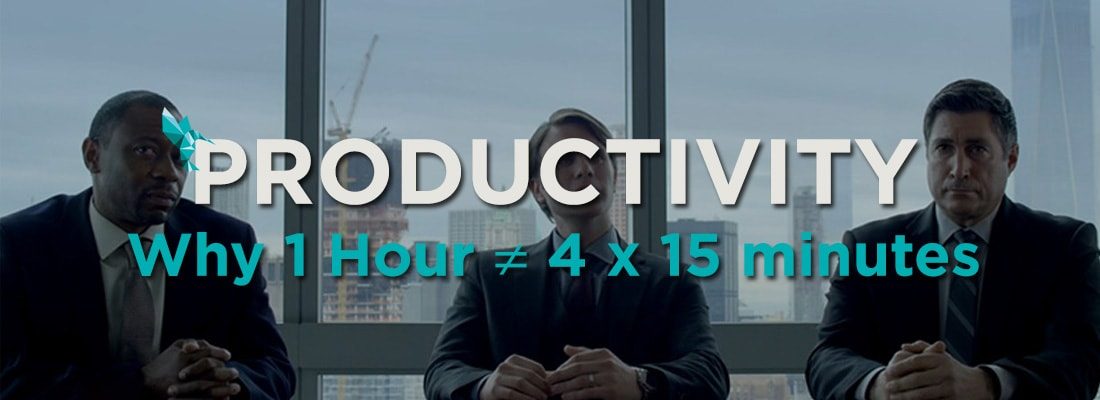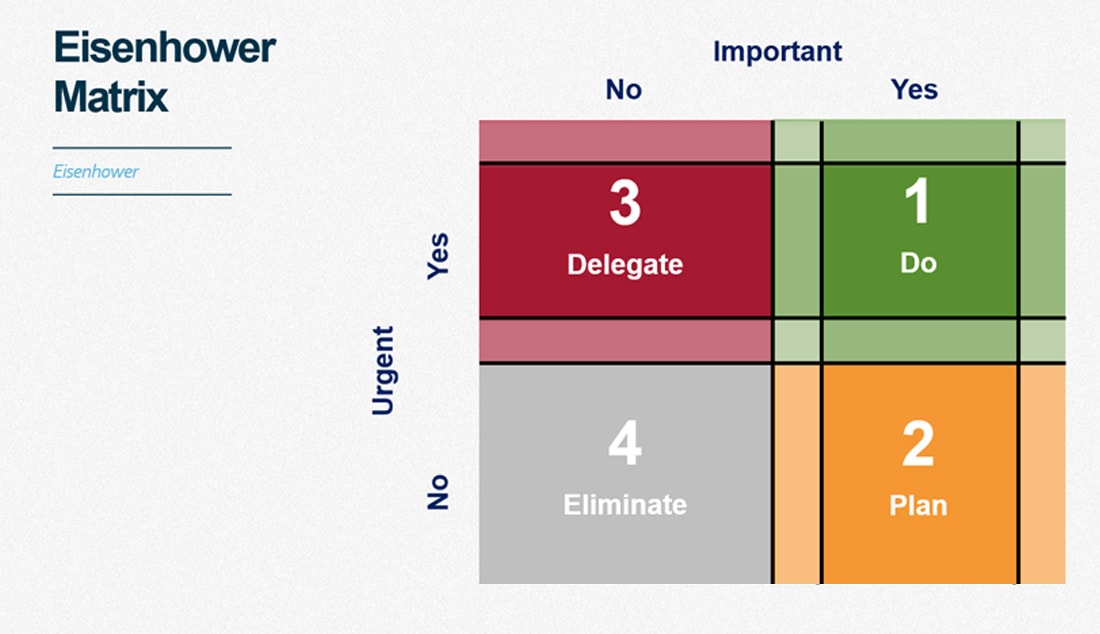
Why 1 Hour ≠ 4 x 15 minutes
Who is familiar with this problem? You plan on finishing the project you’ve been working on for the past few weeks. You just need a few hours to get things done, just one more chapter to write, or one more idea to crystallise. But as soon as you sit down at your desk, a colleague drops by for a talk. And after you started your computer and was about to begin, you get called into a meeting. The rest of the day continues at the same pace. You plan on getting to the project, but you find 20 new emails waiting for you, someone puts on the Christmas station, and you get to hear about the great weekend your colleague had.
Most of our days at work look like this. We work for small sprints of 10 to 15 minutes, then switch tasks and work on something else. We fill our days with 36 blocks of 15 minutes, but we seem to not get 36 things done. We even sometimes feel that we get nothing done. The workday has become a collection of work moments. So why does this happen? And what can we do about it? Because, how cool would it be if you could have 4 straight hours to yourself? How amazing would that be?
Psychology: Our brains are wired for the urgent things
When a colleague asks you to help you with a small task that needs to be finished before lunch, you say yes. It won’t take a lot of time, it helps you bond with your colleague, and maybe even gives you the karma to ask something in return the next time you have an emergency.
This type of work, however, is urgent but not important. It’s work that most probably wasn’t in your job description. It’s work that keeps you from your real job. And it’s work that many of us engage in every day. We do this because we love to feel important. Your colleague needed you, you were there for him or her. It feels good and is something that you may expect back later. But colleagues are the real distraction in the workplace. It’s not Facebook, nor Twitter, it’s this type of work that keeps you from achieving the real goals.
Another way your colleagues keep you from doing the important (but non-urgent) work, is with M&Ms. That stands for Managers and Meetings. The whole job of a (traditional) manager is to interrupt others, to ask them what they are doing, to help everyone stay on tasks (by distracting them). Meetings are, like the managers, mostly a waste of time. How many times have you set in a meeting where you had nothing to contribute? Or did you attend a meeting from which you could just as easily have read the notes? A meeting with 5 people for an hour is not a 1-hour meeting, it’s a 5-hour meeting (not including preparations).
Work can be divided into four distinct categories. They range from important to not important, and urgent to not urgent. We tend to focus on things that are urgent, whilst we should actually focus on the tasks that are important. Here is how you can do it:

After a long day at work, most people cannot readily name what they have achieved. When asked the question what the long-term impact is what you have been working on for 8-12 hours, most have no idea. This is where the Eisenhower Matrix comes into play. It is the perfect tool for separating the (1) tasks that you need to do, (2) things to plan, (3) what to delegate, and (4) what to eliminate. Using the Eisenhower Matrix will make you more productive by becoming more effective. read more…
Productivity: Thinking takes time
Einstein didn’t come up with his theory of general relativity after an apple fell on his head. It was the result of years of working, making theories, sitting on the problem and eventually coming up with his revolutionary theory (and maybe there were apples involved). This was possible for Einstein because he had long periods of uninterrupted work. He would do his clerk job during the start of the day, theorise about the universe in the afternoon and evening. He had no managers, no meetings, no distractions.
When you search for uninterrupted work you get a surprising result. Not Forbes, Inc, Harvard Business Review or other publications show up. No, it’s the Montessori school system that knows best how to apply this principle. They set aside three hours of uninterrupted work for kids, that is how they get things done. But in our busy day-to-day life, we don’t seem to find the time to work in long stretches. Here is why we should find that time.
Work is like sleep. No, it’s not so boring that you would go directly to sleep (at least we hope). Work is like sleep because in both you go through phases. In sleep, you rest most when you’re in the fourth and fifth (REM) stage. This can take anywhere from 60 to 120 minutes to reach. In work, it’s the same. Problems aren’t solved in minutes, no you have to work on them for a long time. A great idea that pops into your mind, doesn’t happen in minute 1. Sometimes you have to take different vantage points, sometimes you have to find the right way to look at a problem by testing out many faulty ways.
Uninterrupted work is important, so how do we get to doing it?
A short self-help guide
- Turn off notifications (email, IM), prevent digital distractions
- Silence the phone
- Guard your time, set aside blocks of time for the important, non-urgent things
- Cancel 1 meeting right now
- And in the future, ask if you really need to be there
Time is the only thing that everyone here on this world has in common. It moves at the same pace for everyone, but you decide how you make use of the time.
Will you move around small pebbles of 15 minutes all day, or will you sit down for a few hours and really get things done? Let us know in the comments below or on the forum how you guard your time (or fail to).
Join our list and explore the benefits of Queal in our free ebook!

No Comments